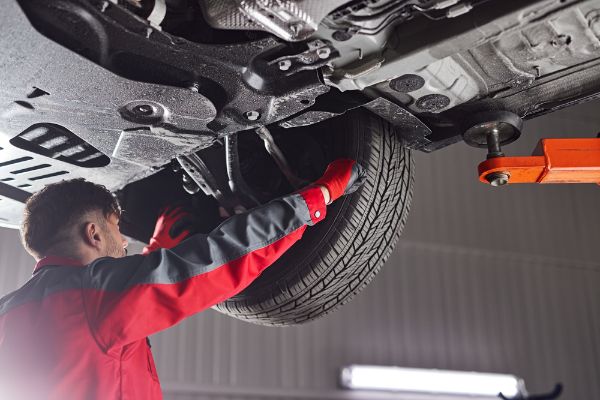Shocks and struts help your vehicle stay steady and smooth. When they wear out, the ride feels rough. Bumps feel bigger. Your steering may start to drift or pull. A bad suspension system changes how your vehicle handles. You might notice it dips forward when braking. You may hear clunks over small bumps. Uneven tire wear also shows up. That’s because the suspension can’t hold the tires flat to the road. Shocks and struts also affect stopping distance. A failing suspension makes braking harder and longer. This becomes dangerous in bad weather or traffic. Your suspension keeps your tires connected to the ground. That is what gives you control. Replacing worn shocks and struts helps you stay safe and in control.
Signs of Worn Shocks and Struts
You do not have to be a mechanic to notice when your vehicle's suspension needs help. These signs may mean it's time for shock or strut replacement:
- The vehicle leans or sways during turns
- It takes longer to stop
- There’s fluid leaking from the shocks or struts
- You hear banging or clunking when driving over bumps
- The front dips when braking
- The rear squats when accelerating
- Tires show uneven wear patterns
- You feel every little crack in the road
Ignoring these signs leads to more damage. A rough ride wears out other parts too. Suspension repairs help protect your brakes, tires, and alignment. Fixing problems early keeps repair costs down.
Why Customers Trust Car Pro Auto Repair for Suspension Repairs
At Car Pro Auto Repair we help drivers stay safe with full suspension inspections and repairs. Our techs check shocks, struts, control arms, bushings, and tie rods. We use trusted parts and detailed inspections to fix it right. If your vehicle bounces, drifts, or dips, our team will find the cause. We make sure the suspension system keeps your ride smooth and safe. Our shop also offers alignment services when suspension parts are replaced. This keeps steering straight and tires wearing evenly. For suspension repair in your area, visit us online at Car Pro Auto Repair or give us a call. Catching issues early saves time and money. Let our team help you feel confident on the road.
Your Ride Shouldn’t Feel Like a Roller Coaster
You drive the same roads every day. You know when something feels off. That bouncing over a speed bump. That clunk when you turn into the driveway. It’s not just wear and tear. It’s your vehicle telling you something’s wrong. Your suspension is meant to make driving feel safe and steady. When shocks and struts wear out, it feels wrong. Some drivers think they just need new tires. But that noise or sway can be a suspension issue. You should not need a mechanic to confirm what you already feel. Trust yourself, and trust a shop that listens. A good repair shop will not brush off your concerns. It will check, explain, and fix the issue with care. Shocks and struts keep your ride safe, and your peace of mind in place.

